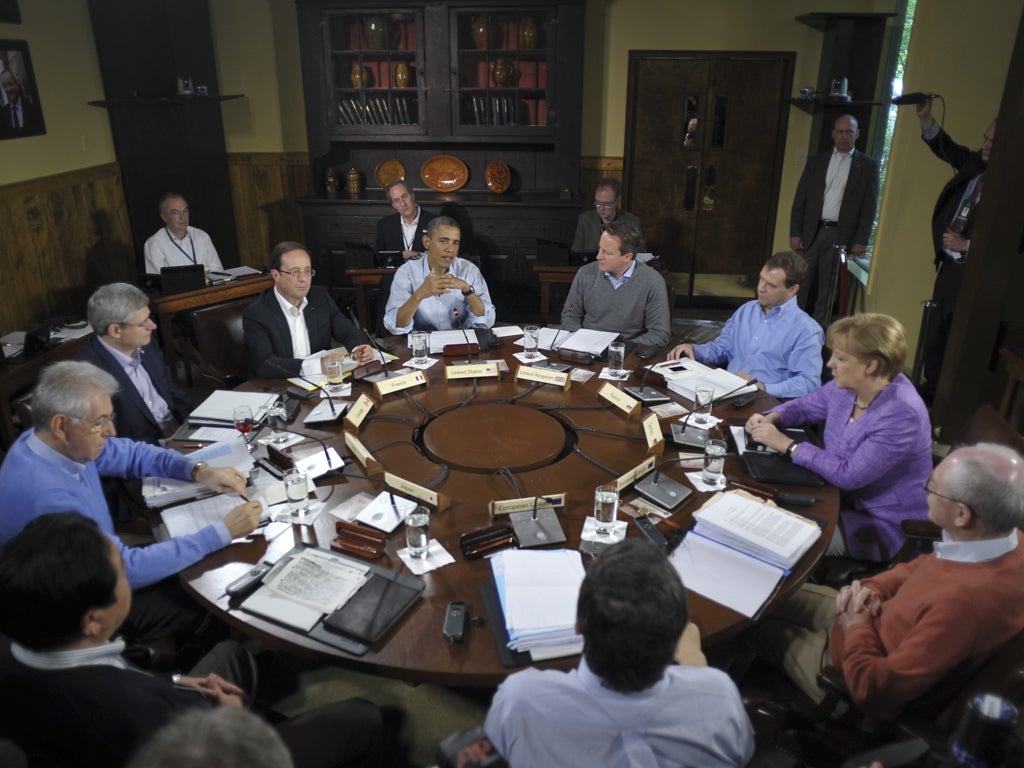Europe's economic woes dominate G8 gathering

Your support helps us to tell the story
From reproductive rights to climate change to Big Tech, The Independent is on the ground when the story is developing. Whether it's investigating the financials of Elon Musk's pro-Trump PAC or producing our latest documentary, 'The A Word', which shines a light on the American women fighting for reproductive rights, we know how important it is to parse out the facts from the messaging.
At such a critical moment in US history, we need reporters on the ground. Your donation allows us to keep sending journalists to speak to both sides of the story.
The Independent is trusted by Americans across the entire political spectrum. And unlike many other quality news outlets, we choose not to lock Americans out of our reporting and analysis with paywalls. We believe quality journalism should be available to everyone, paid for by those who can afford it.
Your support makes all the difference.US President Barack Obama pledged at a Group of Eight summit today to work with Europe on a package that balances growth with debt reduction as world leaders try to prevent the worsening eurozone crisis from destabilizing the global economy.
At the wooded Camp David retreat in Maryland's Catoctin Mountains, Obama and leaders from other major economic powers are seeking ways to soothe financial markets after worries about Spain's banking problems and the risk of a Greek exit from the eurozone sent world stocks to their lowest levels this year.
A shirt-sleeved Obama opened the morning session on the global economy at a rustic lodge, promising to seek ways to restore healthy growth and jobs and address concerns in Europe.
"All of us are absolutely committed to making sure that both growth and stability, and fiscal consolidation, are part of an overall package in order to achieve the kind of prosperity for our citizens we all are looking for," Obama said.
After an early morning meeting with Obama, British Prime Minister David Cameron said he detected a "growing sense of urgency that action needs to be taken" on the euro zone crisis.
"Contingency plans need to be put in place and the strengthening of banks, governance, firewalls - all of those things need to take place very fast," he told reporters.
European Union leaders seemed keen to stress yesterday that they would stand firm in protecting their banks, after news of escalating bad loans raised the specter that rescuing Spain's banks would crash the eurozone's fourth largest economy.
"We will do whatever is needed to guarantee the financial stability of the euro zone," EU President Herman Van Rompuy said.
Earlier French President Francois Hollande suggested using European funds to inject capital into Spain's banks, which would mark a significant acceleration of EU rescue efforts.
Balancing a growth agenda with efforts to lower government debt through fiscal belt tightening is a crucial part of the G8 discussions. Obama has aligned himself with Italy's Prime Minister Mario Monti and the new French president in putting more emphasis on growth.
That places pressure on German Chancellor Angela Merkel, who has pushed fiscal austerity as a the prime means of bringing down huge debt levels that are burdening European economies.
Voters in eurozone countries have shown frustration with that approach, ejecting the Greek government and in France the conservative Nicolas Sarkozy was defeated by Hollande, a socialist, in the May 6 elections.
A draft of the summit communiqué shown to Reuters will stress an "imperative to create growth and jobs."
There are signs of softening in Germany's austerity stance.
Its largest industrial union IG Metall struck its biggest pay deal in 20 years early on Saturday. The 4.3-per cent pay increase, more than double Germany's inflation rate, will boost worker buying power in the eurozone's richest nation and lift consumption - something the United States long has urged as a means to bolster overall growth throughout the world's second largest economic region.
Also on the summit agenda are concerns about oil and food prices as well as Afghanistan, Iran, Syria and North Korea.
Speculation has grown that Obama will use an energy session at the G8 to seek support to tap emergency oil reserves before a European Union embargo of Iranian crude takes effect in July.
But with oil prices already sliding, a move by Obama to tap the Strategic Petroleum Reserve - alone or along with other countries - could expose him to criticism that the emergency supply should only be touched in a supply crisis.
The Camp David summit kicked off four days of intensive diplomacy that will test leaders' ability to quell unease over the threat of another financial meltdown as well as plans to wind down the unpopular war in Afghanistan.
After the Camp David talks wrap up late on Saturday afternoon, Obama will fly to his home town of Chicago where he will host a two-day NATO meeting at which the Afghanistan war will be the central topic.
Reuters
Join our commenting forum
Join thought-provoking conversations, follow other Independent readers and see their replies
Comments